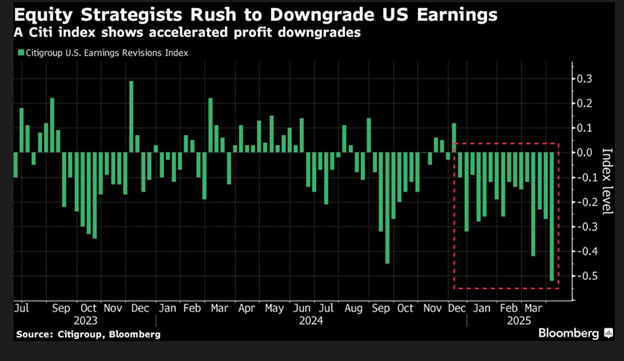David Ricciardelli
April 21, 2025
Financial literacy EconomyA Trump-certain Range
"There are decades where nothing happens; and there are weeks where decades happen"?
Vladimir Lenin
The quote seems apt given the pace of change the US administration drives. We will rarely pop into your inbox three times in five weeks (Trump-certainty, it's like uncertainty but less certain on March 16th; Tariffs! April 7th), but the pace of change and the abundance of questions we are fielding from clients inspired us to share some charts that are inspiring us.
A Range Bound Market
With a 90-day reprieve on most tariffs taking us to the long weekend in July (apologies to anyone planning an early summer vacation!), we expect markets to be range bound in the near term. Strong earnings and foreign countries successfully negotiating offramps from tariffs will likely push the market closer to the top of its trading range. Reciprocal tariffs/escalation and soft guidance (or the withdrawal of guidance) from corporations may move the market closer to the bottom of its trading range.
Studying Markets has Biassed us to Stay Invested
The symmetry of the chart below always catches my eye. Notice how the best and worst days in the stock market cluster, creating a nightmare for market timers.

After large four-day declines, historically the market has been significantly higher one, two and five years later.

Similarly, markets have historically done well after a spike in the S&P 500 Volatility Index (the VIX).

Year to date, the peak-to-trough decline for S&P 500 based on closing prices is 18.9%. The chart below shows the robust returns and frequency of positive returns for the S&P 500 after a 15% decline over the next one, three, five and ten years.

Sentiment has Quickly Collapsed
Sell side analysts have been slashing top-down earnings estimates for the S&P 500.

Investor sentiment has fallen to the fifth-lowest reading ever recorded in the Bank of America Fund Manager survey.

Cash balances are also quickly closing in on a contrarian buy signal.

Structural Change Creates Opportunity for Investors
A client highlighted these two maps from Visual Capitalist that show each country's top trading partner in 2000 and 2024. The pattern is clear and may be one of the inspirations for the US administration.


As we suggested in Tariffs, even if the tariffs are not implemented, they may have already caused long-term structural changes to global trade. Should regional trading blocks emerge, investing in companies that benefit or pivot to take advantage of these structural changes could provide a lucrative opportunity for investors.
What's an Investor to Do?
We recommend that investors save and invest consistently across market cycles. This process will allow an investor to buy more securities when the market is inexpensive and fewer securities when the market is expensive. Consistently investing across market cycles also provides investors with fresh capital to exploit emerging structural changes.
To smooth out the market cycle and reduce volatility, we recommend a barbell strategy where high-quality companies exposed to secular themes provide exposure to equity markets. The other side of the barbell is cash, actively managed fixed income and alternative investments that reduce volatility and provide ballast for portfolios. For investors in the distribution phase of their lives, the focus expands to optimize the tax efficiency of distributions.
Please get in touch with me for a more detailed discussion.
Delli (delli@cibc.com)
Disclaimers:
This information, including any opinion, is based on various sources believed to be reliable, but its accuracy cannot be guaranteed and is subject to change. CIBC and CIBC World Markets Inc., their affiliates, directors, officers, and employees may buy, sell, or hold a position in securities of a company mentioned herein, its affiliates or subsidiaries, and may also perform financial advisory services, investment banking or other services for, or have lending or other credit relationships with the same. CIBC World Markets Inc. and its representatives will receive sales commissions and a spread between the bid and ask prices if you purchase, sell, or hold the securities referred to above. © CIBC World Markets Inc. 2025.
Commissions, trailing commissions, management fees, and expenses may all be associated with hedge fund investments. Hedge funds may be sold by Prospectus to the general public, but more often are sold by Offering Memorandum to those investors who meet certain eligibility or minimum purchase requirements. An Offering Memorandum is not required in some jurisdictions. The Prospectus or Offering Memorandum contains important information about hedge funds - you should obtain a copy and read it before making an investment decision. Hedge funds are not guaranteed. Their value changes frequently, and past performance may not be repeated. Hedge funds are for sophisticated investors only.
If you are currently a CIBC Wood Gundy client, please contact your Investment Advisor.




